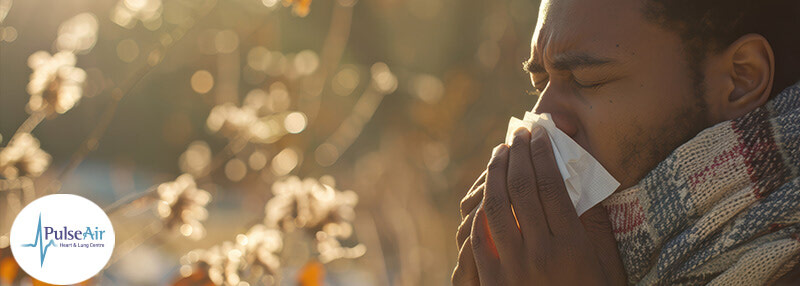As the vibrant colors of fall begin to emerge, so do seasonal allergies for many of us. While the beauty of autumn is undeniable, the sneezing, itchy eyes, and congestion that accompany fall allergies can put a damper on the season. Understanding how to manage these symptoms effectively is key to enjoying this time of year. At PulseAir Heart and Lung Centre, we offer comprehensive allergy testing services to help you manage your seasonal allergies and breathe easier.
Understanding Fall Allergies
Fall allergies are typically triggered by specific allergens that are more prevalent during this season. Common allergens include:
- Ragweed: One of the most common culprits, ragweed pollen can travel great distances, affecting allergy sufferers even in urban areas.
- Mold: Damp leaves and soil create the perfect environment for mold to thrive. Inhaled mold spores can trigger allergy symptoms.
- Dust Mites: As temperatures drop and heaters are turned on, dust mites trapped in carpets, upholstery, and bedding are often released into the air, causing allergic reactions.
Symptoms of Fall Allergies
The symptoms of fall allergies can vary from person to person, but common signs include:
- Sneezing
- Runny or stuffy nose
- Itchy or watery eyes
- Coughing or throat irritation
- Sinus pressure and headaches
- Fatigue
These symptoms can be mistaken for a common cold, but if they persist, it’s likely that allergies are the cause.
Tips for Managing Seasonal Allergy Symptoms
Managing your allergy symptoms during the fall requires a combination of preventive measures and treatments. Here are some tips to help you stay ahead of your allergies:
- Monitor Pollen Counts: Stay informed about local pollen counts by checking weather reports or using an allergy app. On days when pollen levels are high, try to stay indoors, especially during peak pollen times in the morning and late afternoon.
- Keep Windows Closed: While fresh air is inviting, keeping windows and doors closed can prevent allergens like pollen and mold spores from entering your home. Use air conditioning to maintain a comfortable indoor environment.
- Change Air Filters Regularly: Ensure your HVAC system’s air filters are changed regularly to trap allergens and improve indoor air quality. Consider using a HEPA filter for added protection.
- Shower After Outdoor Activities: Pollen can cling to your skin, hair, and clothing. Showering and changing clothes after spending time outdoors can help reduce exposure to allergens.
- Clean Regularly: Dust mites and mold can accumulate in your home. Regular cleaning, including vacuuming carpets, washing bedding in hot water, and wiping down surfaces, can help minimize allergens.
Allergy Testing and Treatment at PulseAir
If you’re struggling with seasonal allergies, early diagnosis and treatment are crucial in managing your symptoms effectively. At PulseAir Heart and Lung Centre, we offer comprehensive allergy testing to identify the specific allergens that are triggering your symptoms. Our testing methods are safe and accurate, providing valuable insights into the best ways to manage your allergies.
Once the allergens are identified, our specialists will work with you to develop a personalized treatment plan. Treatment options may include:
- Antihistamines: These medications help reduce sneezing, itching, and runny noses by blocking the effects of histamines, which are released during an allergic reaction.
- Nasal Corticosteroids: These sprays reduce inflammation in the nasal passages, alleviating congestion and other symptoms.
- Allergen Immunotherapy (Allergy Shots): For more severe allergies, immunotherapy can help desensitize your immune system to specific allergens over time, reducing the severity of your reactions.
- Lifestyle Recommendations: In addition to medical treatments, we provide guidance on lifestyle changes that can help minimize your exposure to allergens.
Importance of Early Diagnosis and Treatment
Addressing seasonal allergies early can prevent them from worsening and interfering with your daily life. Untreated allergies can lead to complications such as sinus infections, asthma flare-ups, and a decreased quality of life. By seeking treatment early, you can manage your symptoms more effectively and enjoy the fall season without the constant discomfort of allergies.
Seasonal allergies don’t have to take the joy out of fall. With the right strategies and support from the experts at PulseAir Heart and Lung Centre, you can manage your symptoms and breathe easier throughout the season. If you’re ready to take control of your seasonal allergies, contact PulseAir Heart and Lung Centre today to schedule your consultation. Our team is dedicated to providing the care and support you need to live a healthier, allergy-free life.


